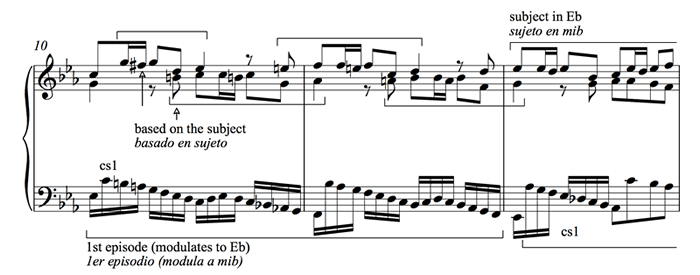Forms : After the Exposition
After the exposition the composer develops the thematic material presented in the exposition. Each fugue has its own structure, but many of them alternate between episodes and subject presentations after the exposition.
Episode
An episode is a section of the fugue where the subject does not appears in a complete form. Episodes are generally done using parts or motives from the subject or countersubjects. In the BWV 847 fugue an episode follows the exposition:

The first 5 notes of the subject are used to create a dialog between soprano and alto. The bass develops the countersubject. This episode is about 2 measures and leads us to the relative major key of Eb major.
Subject Presentation
Once in the key of Eb major, Bach presents the subject in the soprano. We will hear the subject just once before another episode. It is up to the composer to decide the number of times the subject will be presented.
The Structure of this Fugue
Episodes and subjects presentation continue until the end of the fugue. Here is the structure of this fugue:
| Exposition measures 1 - 10 |
Episode
10 - 11 |
Presentation 12 - 14 |
Episode 14 - 15 |
Presentation 16 - 18 |
Episode 18 - 20 |
Presentation 21 - 23 |
Episode 23 - 27 |
Presentation 27 - 32 |
|||||
| S | Answer | transition | cs 1 | Subject Eb major |
cs 1 | Subject C minor |
cs 1 | Subject C minor |
|||||
| A | Subject | cs 1 | cs 2 | Subject C minor |
cs 1 | cs 2 | |||||||
| B | Subject | cs 1 | cs 2 | cs 2 | Subject C minor |
||||||||
Complete analysis of the BWV 847 fugue.
